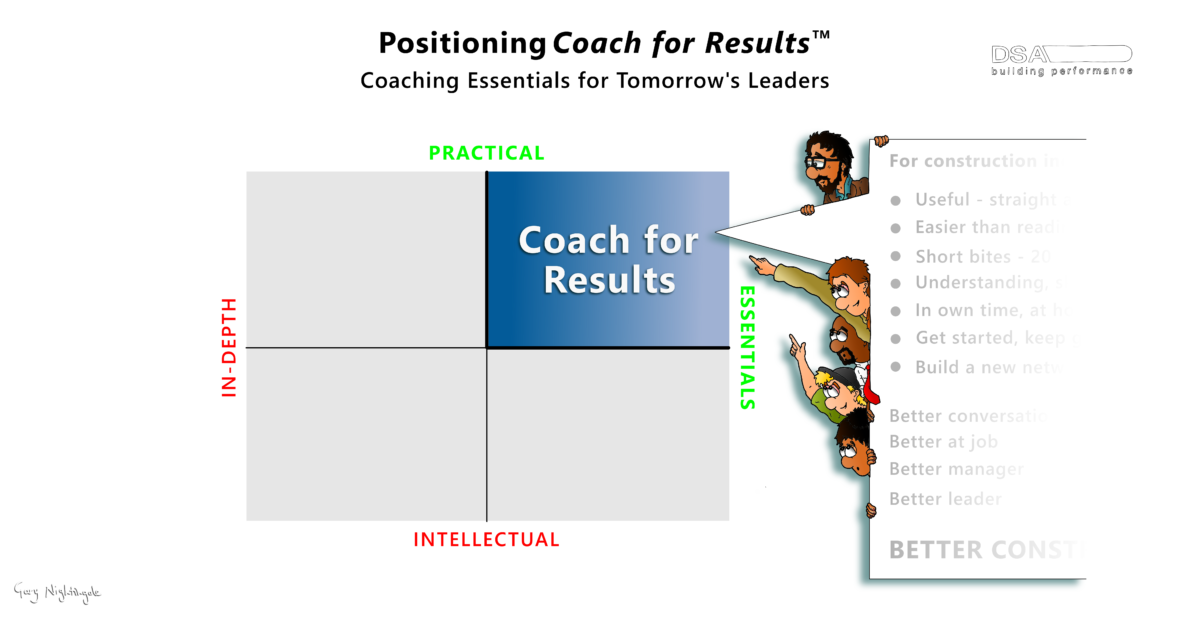If it works in sport, it can work in construction

Construction is more a people industry than a technical industry, and I say that as a chartered civil engineer.
Teams of people with technical competence come together to achieve difficult things under pressure.
Success starts with technical competence, but it quickly moves on to something else: the mysterious art of working together.
Given this basic nature of our industry, it’s extraordinary that it offers no formal training in the art of working together.
It’s a gap that I believe fuels our chronic problems like poor productivity, disputes, defects, mediocre engagement, and the shortage of skills.
The CIOB and I are working on a plan to close this gap.
The plan is to teach thousands of young construction professionals how to incorporate the basic techniques of coaching into their style of interpersonal dealings.
They might be in management or other leadership roles, or they might be important members of a team. Wherever they are in their careers, this course will help them to better engage the people around them, to foster trust and buy-in, and to inspire their teams to pull together to achieve ambitious results.
If it works in sport, it can work in our industry. In fact, I know it works in our industry because, as a coach of executive teams in construction, I’ve seen it work.
I’ll describe the course here, and then I’ll set out some of the thinking behind it.
Coach for Results
The course I’m developing with the CIOB is called Coach for Results. It’s a series of 20 short videos (four minutes each) that explain the basic techniques of coaching, which participants can start using right away.
Each video has a piece of homework that participants complete and share on a social platform accessible to most devices. This lets them learn from each other and network, which will be interesting and fun.
Two videos are released each week, so it’s a ten-week course if you go at that pace, or longer if you want to take it slower.
The cost is £100.
For that you’ll get simple, practical tools, plus a career-changing awareness of the power that a coaching style has to deliver out-of-the-ordinary results.
We launch in March next year.
So, why coaching?
Smart people know that to get things done they have to involve other people. The foundation of results is relationships.
In construction, however, the default management setting is command and control: giving orders and expecting compliance.
This works in the army because everyone submits to an explicit chain of command, but it fails in construction because a project has multiple chains of command, often with interests that don’t naturally align.
We use the contract as a proxy for a single chain of command, but the contract is a passive document that only flexes its muscles when issues have descended into disputes, by which time it’s too late to avoid the cost, delay and ill will disputes generate.
Disputes represent the failure to work together, and winning a dispute is not a good result, it’s a less expensive failure.


Coach for Results
Designed with young professionals in mind
Perform better in your current role, become an effective manager and over time a great leader and together we will change the construction industry.
The potent space we neglect
What we neglect is that potent space between the signing of the contract (our declaration of intent to work together) and the moment we call the lawyers because it has all gone wrong.
That space is where the art of working together is needed, and coaching techniques, practiced by a growing number of people, is how to make the most of it.
Coaching isn’t some mysterious thing. It’s having purposeful conversations that foster engagement, trust and buy-in. Anyone can do it once they learn how.
Imagine thousands of young professionals out there, including in your company, fostering engagement, trust and buy-in, and growing into effective leaders.
It would change the industry from the ground up.
Practice, not theory
Note: this course is for the construction industry, my professional home since I was 16.
I know the industry, having started as a trainee and worked my way up to middle manager at Taylor Woodrow, before leading a successful, company-wide culture change programme at Wates, with a number of stops in between.
So the course will be practical, not theoretical, designed to address the situations that arise in construction where a coaching style of working together can avert problems and get results.
I’m so excited about this course because, at last, it melds two great passions in my life: construction and coaching.
I believe the two very badly need to go together.
Chief executives, lend me your ear
My message to chief executives and managing directors is this: the aim of Coach for Results is to help your people become more effective leaders.
People who do this course will go on to ignite pockets of excitement and engagement in your company, and those pockets will grow and link up because people learn from each other. The aim is to start and sustain a virtuous circle.
We want the course to meet the needs of young professionals, so, with the CIOB, I’m convening a focus group to enlist their help in fine tuning the Coach for Results course.
If you lead a company or organisation and want to fire it up and the same time change the construction industry, call me on +44 7904 186855. It’s your legacy and mine.
